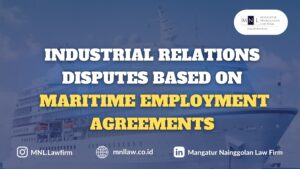
Industrial relations disputes can arise from differences in interpretation and/or implementation of employment agreements. Employment agreements are generally regulated by Law No. 13 of 2003 on Manpower (“Manpower Law”). However, there are employment agreements that are specifically regulated in separate legislation, namely maritime employment agreements. As a result, the resolution of disputes based on maritime employment agreements has characteristics that differ from those of general disputes.
Maritime Employment Agreement
Article 1 Number 14 of the Manpower Act defines an employment agreement as an agreement between workers/laborers and employers or employers that contains the terms and conditions of employment, rights, and obligations of the parties.
Meanwhile, a maritime employment agreement not only refers to the Labor Law but also contains specific provisions as stipulated in the Commercial Code (“KUHD”) and Government Regulation of the Republic of Indonesia Number 7 of 2000 on Maritime Affairs (“Government Regulation on Maritime Affairs”). Pursuant to the PP on Maritime Affairs, a maritime employment contract is an individual employment contract signed by an Indonesian seafarer with a shipping company operating in maritime waters.
Industrial Relations Disputes Based on Maritime Employment Agreements
Industrial relations disputes are disputes that arise between workers (employees) and employers. These disputes are based on differences of opinion between employers and workers/laborers or labor unions/workers’ unions regarding rights, interests, termination of employment, or disputes between labor unions within a company.
Meanwhile, industrial relations disputes arising from maritime employment agreements are disputes arising from differences of opinion between shipowners and crew members based on maritime employment agreements.
Settlement of Industrial Relations Disputes Based on Maritime Employment Agreements
The settlement of industrial relations disputes is an effort to resolve differences of opinion or conflicts between workers/laborers and employers regarding rights, interests, termination of employment, or disputes between labor unions within a company.
In accordance with the Labor Law, the resolution of industrial relations disputes is carried out through the following stages:
- Bipartite negotiations, which are negotiations between employees or workers and employers.
- Tripartite negotiations, which are negotiations between employees or workers and employers involving a third party. Such resolution may be achieved through mediation, reconciliation, or arbitration.
- Through the Industrial Relations Court
Specifically regarding the resolution of industrial relations disputes based on maritime employment agreements, the process of resolving industrial relations disputes in industrial relations courts has been regulated in such a manner in the Supreme Court Circular Letter No. 2 of 2024 on the Implementation of the Results of the Plenary Meeting of the Supreme Court Chambers in 2024 as a Guide for the Performance of Duties by Courts Regarding The Implementation of the Civil Chamber’s Resolution, which states:
- Disputes between crew members and shipowners are resolved in accordance with the Maritime Employment Agreement (PKL) based on the Commercial Code (KUHD) and the Shipping Act along with its implementing regulations. In cases where the Commercial Code and the Shipping Act, along with their implementing regulations, do not provide for such matters, the resolution shall be based on labor regulations.
- Parties involved in disputes related to labor relations in the shipping sector based on the PKL may file a lawsuit with the industrial relations court in the place where the PKL was made and signed in the port authority office area or in the place where the worker last worked.
Conclusion
Based on SEMA Number 2 of 2024, disputes between crew members and ship operators are resolved based on the Maritime Employment Agreement (PKL) which refers to the KUHD and the Shipping Law. If not regulated in both regulations, then the resolution follows the Manpower Law. The MCA is a form of employment agreement between seafarers and employers that outlines the rights and obligations of the parties and must be approved by the port authority. Disputes that arise are resolved through the mechanisms of the Industrial Relations Act (UU PPHI), namely: bilateral, tripartite (mediation, conciliation, or arbitration), and litigation before the Industrial Relations Court (PHI).
Legal Basis
Law No. 2 of 2004 concerning Industrial Relations Dispute Resolution
Commercial Law Code (KUHD) Article 401
Law No. 13 of 2003 on Labor
Supreme Court Circular Letter No. 2 of 2024 on the Implementation of the Results of the Plenary Meeting of the Supreme Court Chamber in 2024 as Guidelines for the Performance of Duties by Courts
Authors:
Renaldi Avri Angga, S.H.
Yuliana Munthe
Editor:
Muhammad Arief Ramadhan, S.H.
